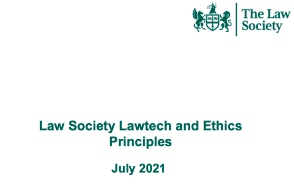Legal Futures reports..
Clients should be put at the heart of legal technology by law firms, including being asked for consent before artificial intelligence (AI) is deployed, solicitors have been told.
The Law Society has published five overriding principles that should govern the design, development and use of lawtech.
They are: regulatory compliance, lawfulness, capability – meaning developers and operators should understand how the software works and what risks or benefits it offers – transparency (so operators and clients understand how solutions have been designed and deployed), and accountability.
The culmination of two years’ work, including interviews last year with 30 law firms, sole practitioners and alternative business structures, the principles seek to ensure that software meets practising obligations and can be readily explained in simple language.
A paper accompanying the principles said solicitors should discuss with clients in plain English why and how AI was being used and what risks and limitations it carried, as well as obtaining their informed consent before using it.
Lawtech-and-ethics-principles-reportDevelopers should make sure law firms that bought the software in the first place had access to data used by AI “underpinning the algorithm or code” so they could make sure it was not biased.
Separately, it acknowledged that, for example, conveyancing clients may just want to ensure the outcome they hoped for was being achieved. By contrast, a corporate client may need to know more before it could approve using a particular solution.
Technology should only be used if it was in the best interests of clients, the paper continued.
For instance, solicitors should be careful not to mislead clients about whether a “more favourable outcome will be achieved in their matter”, such as when using predictive analytic software in litigation.
Read more at https://www.legalfutures.co.uk/latest-news/law-society-solicitors-must-not-use-ai-without-clients-consent




